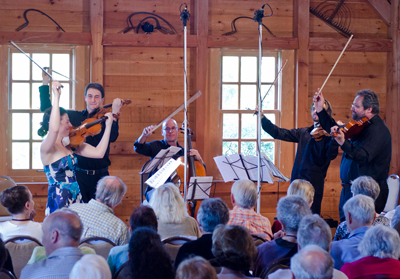by Daniel Hathaway

There’s barely room to swing a viola there, much less accommodate a grand piano, so Mirrors was devoted to music by Purcell, Britten and Mendelssohn for three, four and five string players who stood (except for the cellists) to save room, optimize sight lines and broadcast the music over the heads of the capacity audience, who were packed into the space on folding chairs. The seating was uncomfortable and the temperature a bit on the warm side, but the afternoon was otherwise completely delightful, with the bonus of free ice cream outside afterward.
Benjamin Britten (1913-1976) has been traditionally hailed as the most important British-born composer since Henry Purcell, whose death in 1695 at the age of 34 snuffed out a career even two years briefer than Mozart’s. Britten was profoundly influenced by the earlier composer, and his second string quartet in C, op. 36 with its final Chacony movement reflects some of Purcell’s compositional techniques. The “Mirrors” theme of Sunday afternoon’s program picked up on that relationship, when violinists Noah Bendix-Balgley and Amy Schwartz Moretti, violists Yu Jin and Yehonatan Berick and cellist Tanya Ell prefaced the Britten quartet with two very brief snapshots of Purcell’s own music.
The Fantasia ‘Upon One Note’, originally a old-style piece for consort of viols gave Berick the challenge of making something expressive out of his intonation of a single “C” as the other players wound Purcell’s sometimes astringent counterpoint around him. His ironic facial expressions were priceless. A brief dance from The Fairy Queen gave a taste of Purcell’s Baroque style and laid the foundation for Britten’s technique of variations over a repeating bass line. In both works, the players avoided using vibrato but played with full-throated tone.
Britten wrote his second quartet in 1945 in homage to Purcell. Its premiere at the Wigmore Hall in London was planned to take place 250 years to the day after Purcell’s death on November 21 (the coincidence of Britten’s birth on St. Cecilia’s day and Purcell’s death on the eve of the feast day of music’s patron saint provides yet another mirror view of the two composers).
The piece is abstract and frequently austere, but Britten’s keen sense of form and brilliant handling of small musical motifs makes the second quartet a compelling listening experience. Those tiny musical ideas — similar to Wagner’s — persist in the subconscious as Britten weaves them together into larger musical statements. There’s always some subliminal musical logic to grab onto wherever the music takes you.
Amy Schwartz Moretti, Diana Cohen, Dimitri Murrath and Julie Albers crafted an intense journey through the quartet, which abounds in white-knuckle moments including very high, exposed lines and a scary scherzo movement. Individual players delivered highly colorful cadenzas as lyrical interruptions between Britten’s highly-structured Chacony variations.
Chasing intensity with cheerful lyricism, Schwartz Moretti, Bendix-Balgley, Berick and Murrath joined with cellist Robert deMaine for the final work on the program, the 17-year-old Felix Mendelssohn’s engaging Quintet No. 1 in A, opus 18. Perfect for a warm summer afternoon concert in a barn surrounded with flowering gardens, the quintet received a glowing performance, and in the case of its skittering Scherzo, a breathtaking one whose ensemble values were remarkable for a group that only comes together on occasions like this.
Co-artistic director Franklin Cohen, looking entirely pleased with the way ChamberFest’s second season had played out, mused after intermission about his New York trial lawyer father’s comment when he announced he wanted to be a musician, “you’ll never make a living at that.” Cohen noted he’d made the right choice, then hinted at a winter presence for ChamberFest and invited suggestions for next year, including new venues to visit.
It’s difficult to imagine improving on the artistic quality of ChamberFest, which seems to have experienced few growing pains in its second-season expansion, but the search for new venues could move this excellent adventure into a wider engagement with music lovers on both sides of the Cuyahoga — and into spaces which, like Dunham Tavern, take advantage of the beauties of nature during Northeast Ohio’s all too brief summers. Any thoughts about that?
Photo by Gary Adams.
Published on ClevelandClassical.com July 2, 2013
Click here for a printable version of this article.


